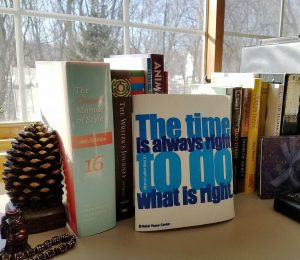By Sherry Roberts

Photo of Philadelphia protest on June 7, 2020 by Chris Plehal.
I am a white woman who lives in a Minnesota suburb, and for a long time I have felt that, based on my life experience, I didn’t have the right to comment on racial issues. But after hearing George Floyd cry “I can’t breathe,” there is no doubt in my mind: We must end white silence.
We cannot sit in our comfortable living rooms and be oblivious to the plight of black Americans in this country anymore—not after watching the murder of Floyd by four Minneapolis police officers, not after seeing the pain and anger of protest marchers across the nation, not after waking up to soldiers and armed but unidentified “police” patrolling the streets of Washington, DC.
Calmer, saner voices on the protest line have cried in frustration, “We must find another way to live together.” How can that be done? First, we must come out of our white cocoons of delusion that everything is all right.
Because it’s not.
It is not right that black men and women live in constant fear of the very people sworn to protect them. Professional policing does not pick and choose who to help and how to help them. It does not give my white call for help priority over the calls of my neighbors of color. It does not meet any of us with aggression or anger.
It is not right that a white woman in New York believed she could use the police as her personal security force to confront an innocent black man who simply asked her to obey the law and leash her dog. This is shameful behavior. Women who use their white privilege and power in this despicable manner must be called out and held accountable.
It is not right that we have built—by law and by doctrine—a system of justice with walls stacked so high no citizen can climb them. How can we have funeral after funeral for black Americans killed by police but no officers are held accountable? Look at our weak, partisan, and porous state and federal laws when it comes to law enforcement. Consider that 40 years ago the Supreme Court created a legal doctrine called “qualified immunity,” which shields law enforcement from accountability. It was meant to defend an officer’s ability to make a snap decision during potentially dangerous situations, but police knelt on George Floyd’s neck for nearly nine minutes. This was not a snap decision; it was a show of power, arrogance, and indifference.
We find ourselves here—having to choose between lawlessness or a law enforcement system we cannot trust— because of white silence. Silence that has echoed in the halls of Congress, the White House, and statehouses across this land for decades. We whites have always had the power to change this situation. And we just haven’t done it because we were comfortable with the status quo, with our position of power that allowed us to be oblivious to growing racial injustice.
Well, I’m not comfortable anymore. I ask you to listen to those in pain; don’t argue with them or tell them to “see it from both sides.” Just stand witness. Then try to learn more and take what you have learned to call for systemic change with your powerful white breath. Are you ready to listen? I am.
And while I am listening and learning, I will be giving our leaders a hard look. What do they do with their power? Do they hold it tight to their narcissistic chests to grow dark and ugly or do they return it to the people to multiply and make the community stronger? Please join me. Vote in every election, from dog catcher to president, for the ones who treat all people like human beings and who promise to help us find another way to live together.
When Martin Luther King was murdered, Robert F. Kennedy urged Americans to dedicate themselves to “tame the savageness of man and make gentle the life of this world.” Black Americans have not lived in a gentle world for 400 years. Coronavirus has sucked the gentleness from all of our lives and opened our eyes to the racial injustice around us.
We can and must end white silence. It is far time that we made gentle the life of this world—for everyone.





